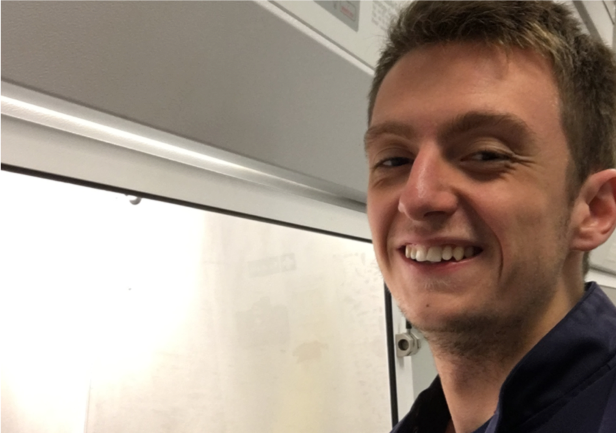Evaluation of genome transmission in the parasite Leishmania after ablation of key DNA replication factors
Posted on December 4, 2019 by David Anderson and Catarina De Almeida Marques
Each year, the Microbiology Society awards a number of grants that enable undergraduates to work on microbiological research projects during the summer vacation. Over the next few months, we’ll be posting a series of articles from members who were awarded Harry Smith Vacation Studentships this summer. This week is David Anderson, a final year Microbiology student at the University of Glasgow.
From the student: David Anderson
The aim of this project was to test the hypothesis that DNA replication in Leishmania is not solely dependent on origin recognition complex (ORC)-defined origins. This would be done by conditionally deleting genes encoding components of ORC and determining if DNA replication is immediately terminated, or if it can continue to progress either temporarily or for a prolonged period by examining parasite growth and replication.
During this project I used polymerase chain reaction (PCR) and cloning to modify existing constructs of the Leishmania major ORC open reading frame to put it between loxP sites. This was also done for constructs of the minichromosome maintenance protein complex (MCM). This complex is essential for DNA replication and was therefore used as a control. These constructs were then checked by PCR and restriction digests.
L. major cells expressing DiCre and Cas9 were then transformed with the constructs, allowing CRISPR to replace the endogenous loci, with selection via antibiotic resistance. Integration was then checked using PCR. DiCre was activated by the addition of Rapamycin to the cultures. These cultures were then monitored, and the growth rates of the L. major cultures were taken daily.
Although we did not manage to get results for all of the components of ORC, due to time constraints and having to repeat sections of the experiment due to things not working, we did manage to get results for ORC 1b and ORC 4. The results were surprising however as there seemed to be little difference between the growth rates of the rapamycin positive L. major cultures compared to the rapamycin negative cultures. This may mean that the presence of these genes is not essential for DNA replication. If this is correct and it is found that the other parts of ORC are not necessary, then this could change the way we look at replication in L. major.
During my project I feel like my confidence in lab work has significantly increased due to the experience of independent lab work, which is something you can’t fully get working in university teaching labs. I now have experience of experiments not working and having to work out the problems and then fix or work around them. I feel like that has given me a greater appreciation of what life is like in an actual research lab and I feel like I am now better equipped to handle these situations if/when they arise again.

From the supervisor: Dr Catarina De Almeida Marques
I believe that the whole process was very valuable for my professional development – from writing the application, to supervising the student, and writing this report. I first came across the Harry Smith Vacation Studentship while browsing the Society’s website for other types of funding. At that time, David had already contacted my supervisor, Professor Richard McCulloch, to show interest in getting laboratory experience during the summer. It was then agreed that I would supervise David during this period. The three of us then agreed that it would be a good experience for both me (in the role of supervisor) and David (as the student) to apply for funding to support his time in the lab.
Applying for the Studentship gave me the experience to write a project proposal and plan a budget. It reiterated that the whole process is made clearer when we take into consideration all the information available on the funder’s website, including how the proposals are evaluated (scoring criteria). It was of great help that all this information is available on the Society’s website in a very clear way.
Once awarded, I went through the experience of contacting the University’s finance team to establish a budget code for the project and establish the payment of David’s stipend. I was named PI on the project and had access to the finance portal to manage the grant; I have never had to deal with this before and it was an enlightening experience, with which my supervisor helped me. I have worked with undergraduate students before, but this time I acted as the student’s main supervisor. We met every day to discuss the results obtained and David’s plans for the day, while we met with Prof McCulloch at the beginning and end of the project. I had to write similar reports to my funders during my PhD, but that was always from a student perspective; writing this report from the supervisor point of view is also a new experience for me, and I am finding it helpful.
Overall, I really enjoyed the whole experience. It gave me an idea of what my supervisor goes through as a PI and has given me an insight into what is expected of me when I start my independent career.

